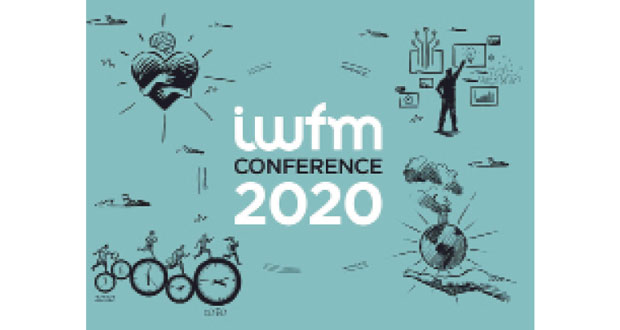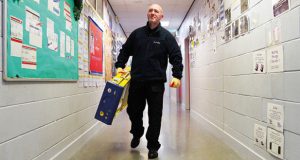Navigating turbulent times, the title of this year’s virtual IWFM conference, was an appropriate theme for 2020, but the mega trends it covered would have benefitted from a closer look at what this means for FM, says Sara Bean
Moved in August to an online format, this year’s IWFM conference, chaired by IWFM’s Director of Insight and Engagement Chris Moriarty, offered delegates an entire week of events; including sponsored presentations from EMCOR on wellbeing and a demonstration by SimPro of its job management software. There was also a range of more offbeat sessions. This included a talk by Science Writer, Broadcaster and Comedian Timandra Harkness on resilience and a presentation on Rebellious Acts of Positive Change, by Author of Be more Pirate , Sam Conniff who asked, “are you really a leader or caretaking for someone else to come along?”
The final day covered four mega trends; climate change, wellbeing, technology and the future of work. This comprised a pretty stellar range of speakers. Majorie Wallace CBE, Founder and CEO of Sane, leading Arctic Ocean Explorer Pen Hadow, Technology Author and Expert Dave Coplin and none other than the Author of the Good Work report, Matthew Taylor, CEO of the Royal Society of Arts. This macro level approach was certainly thought provoking, but it felt at times there was a need to drill down to apply some of the lessons learnt to the FM sector.
CLIMATE TO CULTURE
Take for example Pen Hadow’s disquieting session on how climate change is affecting the polar region and its wider impact on our planet. He revealed that because the sea ice has been dramatically reduced by global warming, commercial shipping is now encroaching into the arctic ocean, leading in turn to more environmental pollution.
This he said: “Raises the question for you – what is your level of ambition? We’ve got to aggressively reduce our carbon emissions into the atmosphere. Our continuation as a race depends on what we do now and you’re in more of a position than the average person to do something about this.” All stirring stuff, but we could have done with a follow up session on the latest insights from within the built environment that might help make that difference.
Former Investigative Journalist, and Chief Executive of mental health charity SANE, Majorie Wallace CBE was a good choice to talk about the effects of lockdown on people’s mental health. She disclosed that the rate of callers talking about suicidal thoughts and self-harm has risen since lockdown and predicts a mental ill health epidemic due to the isolation felt by many of those working from home. Loneliness can be a killer
she said, citing a study by Sane of 300,000 people which revealed it is associated with a 29 per cent increase in mortality. “It is a significant factor in poorer health outcomes and premature death, which is why we need to balance these risks,” she warned.
In his look at technology, Dave Coplin described the practice of enduring a “dehumanising commute to be in a particular location when office workers are often more interested in the piece of plastic they’re carrying with them to actually do the work”.
Pre-COVID, work was a destination, described as going to work, but what’s become clearer than ever over the last six months is that work is an activity, he explained. “Not somewhere you go, but something you do. Work is the thing we make happen, rather than the location.”
One of the few good things about the pandemic he added is that it has helped cut through the red tape which held organisations back in utilising technology. In just one example, organisations are no longer averse to hiring people online, or using data to measure usage and occupancy. Coplin concluded the disruption caused by COVID spells a huge opportunity to change the way we work. “The organisations that start to do this will start to accelerate and reap the rewards, not at the cost of their people but in terms of levels of engagement.”
FUTURE PROOF
The final mega trend of the conference – the Future of Work was appropriately delivered by Matthew Taylor, Author of Good Work, the Taylor review of modern working practices . He avoided making any kind of what he called ‘inglorious’ predictions on the future of work, but instead focused on asking the right questions. Saying, “how do we respond to technology?” is wrong, a better phraseology is “how do we use technology to help us create a better world?”
He advised that the quality of people’s working lives is an important measure of progress, so any starting point should be, what do we want from work? He also advised that if we want people to be enthusiastic about automation, we need to convince them it won’t make their working lives worse.
Chair Chris Moriarty was keen to discover Taylor’s views on how low paid workers, including those within the FM sector, such as cleaners and security staff, societal worth has been rightly elevated by taking front line roles during the pandemic, and what this should tell us about valuing our staff?
Taylor agreed there is a gap between many operatives social value and their economic or market value and argued that one of the issues is that “the interests of consumers and producers lead to practices that are designed to provide cheap services, and because of that it seems inconceivable you can include decent pay and working conditions within those systems. We need to work to achieve a better balance, which requires our systems to change.”
Taylor added that it is up to institutes such as the RCA and the IWFM to help push forward social changes: “Unless we reconcile ourselves to working in a sector where a lot of people are never going to be economically secure and never have jobs that give them dignity and opportunity.”
So, if the crisis offers an opportunity for a step change in how we work, people’s expectations of the quality of their workplace will rise. As Taylor suggested, in a world where more people are working from home FMs now have the capacity to think more deeply on how it can influence people’s working lives. As Moriarty reflected, this represents a “Call to arms that we, as a group of professionals can be right at the centre of enabling good work.”





